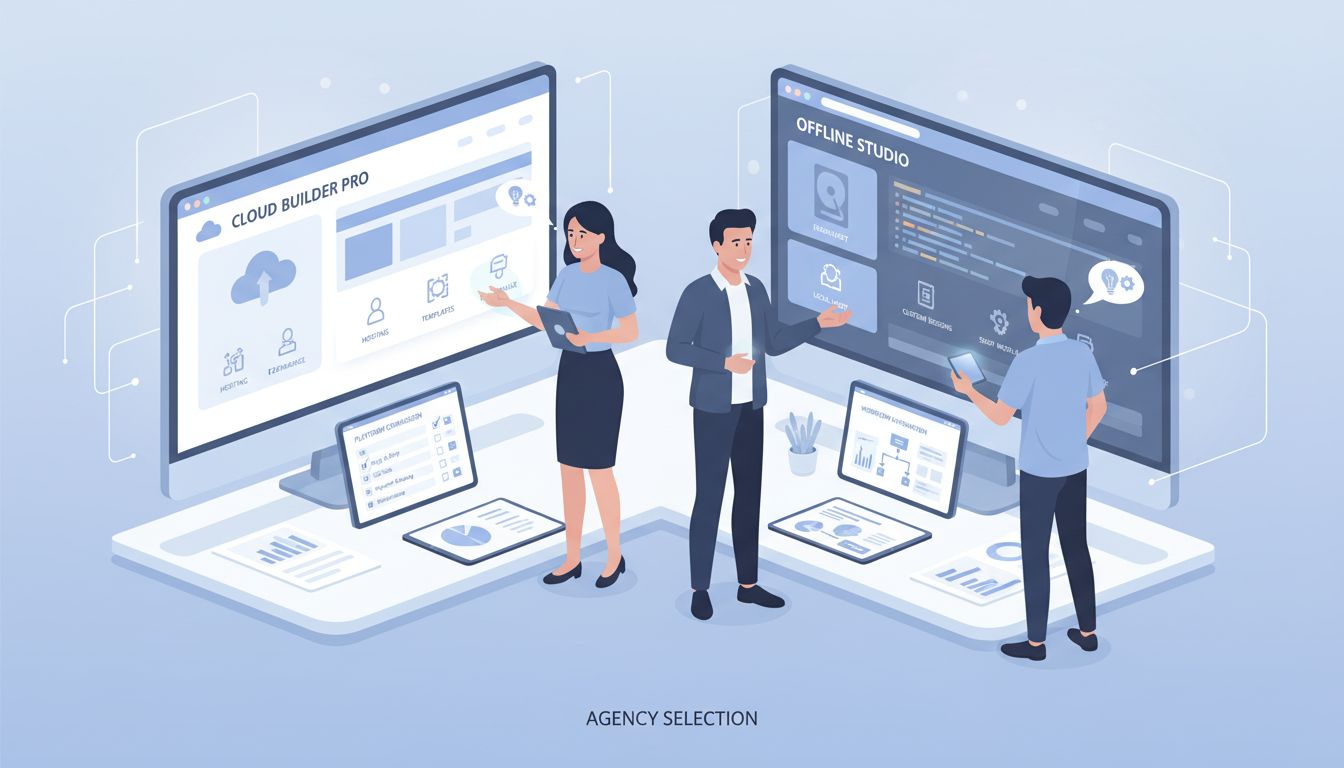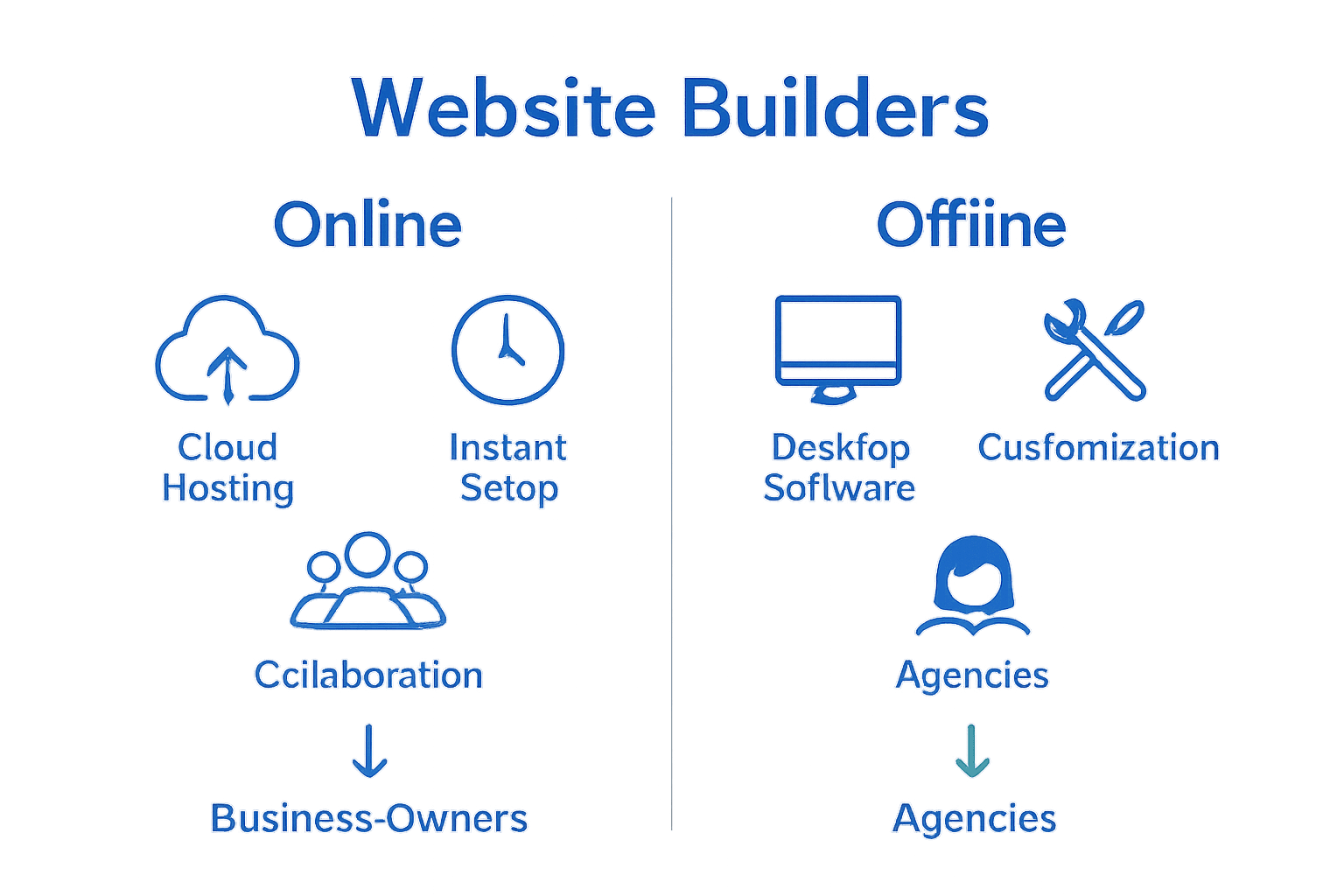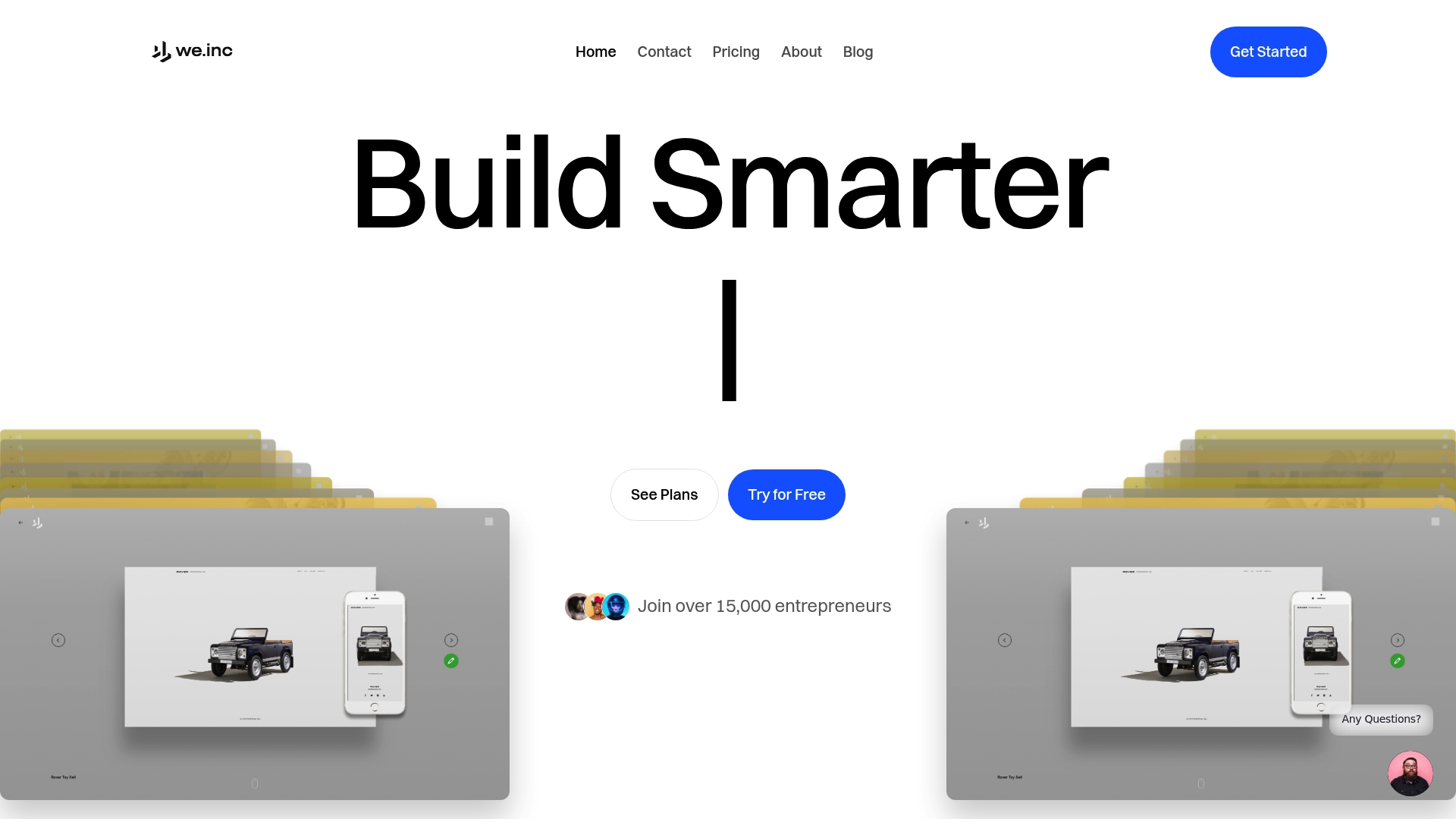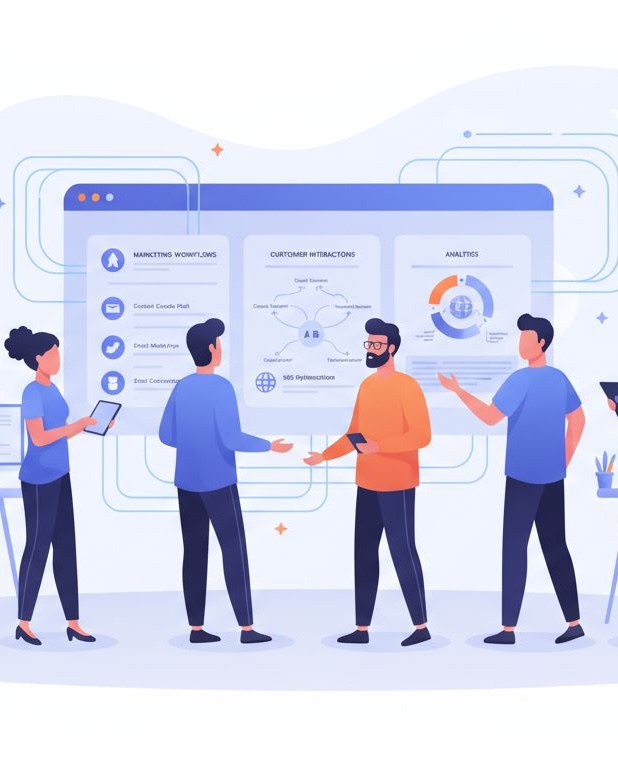What Is a Website Builder? Complete Guide

Did you know that over 43 percent of all websites are built without touching a single line of code? For many entrepreneurs and small business owners, launching a digital presence has become faster and easier than ever before. With modern website builders, anyone can craft a polished site using simple drag and drop tools, saving both time and money. This shift empowers creatives and professionals to focus on growing their brand instead of wrestling with complicated technology.
Table of Contents
- Website Builder Defined: Core Concepts Explained
- Major Types of Website Builders Compared
- Key Features and User Benefits Unpacked
- How Website Builders Streamline Site Creation
- Common Mistakes and Limitations to Avoid
Key Takeaways
| Point | Details |
|---|---|
| User-Friendly Design | Website builders offer intuitive interfaces that simplify website creation for users without technical skills. |
| Diverse Platform Options | There are various types of website builders catering to different user needs, including e-commerce and portfolio sites. |
| Cost vs. Features | Free versions often come with limitations; it’s crucial to assess long-term goals when selecting a website builder. |
| Strategic Digital Presence | Website builders empower businesses to quickly establish and adapt their online identity without extensive coding knowledge. |
Website Builder Defined: Core Concepts Explained
A website builder is a digital tool that empowers entrepreneurs, small business owners, and digital professionals to create websites without requiring advanced coding knowledge. According to Wikipedia, website builders allow the construction of websites without manual code editing, falling into two primary categories: online proprietary tools provided by web hosting companies and offline software that runs on a computer to create and edit web pages before publishing.
These innovative platforms democratize web design by providing user-friendly interfaces that transform complex technical processes into simple, drag-and-drop experiences. Professionals can now rapidly prototype, design, and launch websites with minimal technical barriers. Typical features include:
- Intuitive visual design interfaces
- Pre-designed templates and themes
- Mobile-responsive layouts
- Integrated hosting solutions
- SEO optimization tools
- E-commerce capabilities
For agencies and freelancers, why use website builders represents more than just convenience—it’s a strategic approach to streamlining digital production. Modern website builders eliminate the need for extensive programming skills, allowing creative professionals to focus on design, branding, and client strategy rather than getting lost in complex coding environments.
By simplifying website creation, these tools have revolutionized how businesses establish their digital presence, making professional-grade websites accessible to everyone from solo entrepreneurs to growing agencies. The result? Faster deployment, lower costs, and increased ability to quickly adapt online marketing strategies.
Major Types of Website Builders Compared
Website builders come in several distinct types, each designed to meet different business needs and technical capabilities. According to Pitt LibGuides, these platforms typically bundle domain, hosting, and content management systems, offering customizable themes, templates, and plugins for creating dynamic websites in both free and paid versions.
The two primary categories of website builders are:
- Online Website Builders
- Cloud-based platforms accessible through web browsers
- Instant setup and minimal technical knowledge required
- Real-time editing and collaboration features
- Integrated hosting and domain management
- Offline Website Builders
- Software installed directly on personal computers
- More advanced customization options
- Ability to work without constant internet connection
- Greater control over design and development process
Professionals can choose between these options based on their specific requirements. Step by Step Website Launch Guide for Entrepreneurs provides additional insights into selecting the right platform for your business needs.
Additionally, website builders are often categorized by their target users:
- DIY Builders: Perfect for individuals and small businesses
- Professional Builders: Advanced tools for agencies and complex projects
- E-commerce Builders: Specialized platforms for online stores
- Portfolio Builders: Focused on showcasing creative work
Understanding these variations helps entrepreneurs make informed decisions about their digital presence, ensuring they select a website builder that aligns with their technical skills, budget, and business objectives.

Here’s a comparison of the major types of website builders:

| Type | Key Features | Ideal Users |
|---|---|---|
| Online Website Builders | Cloud-based Instant setup Real-time collaboration |
Beginners Small businesses |
| Offline Website Builders | Installed software Advanced customization Offline work |
Designers Agencies |
| DIY Builders | Easy templates Drag-and-drop Low cost |
Individuals Startups |
| Professional Builders | Advanced tools Custom code Team support |
Agencies Large projects |
| E-commerce Builders | Store management Payment gateways Product catalogs |
Online retailers |
| Portfolio Builders | Visual galleries Media integration Elegant layouts |
Creatives Freelancers |
Key Features and User Benefits Unpacked
Website builders have revolutionized digital creation by offering powerful tools that transform complex web development into accessible, user-friendly experiences. According to Wikipedia, modern platforms provide comprehensive services that enable users to create HTML5 websites for desktop and mobile platforms using intuitive drag-and-drop editing interfaces.
The core features that make website builders exceptional include:
- Drag-and-Drop Design
- Mobile Responsiveness
- Pre-Built Templates
- Built-In SEO Tools
- E-commerce Integration
- Social Media Connectivity
For entrepreneurs and small businesses, these platforms eliminate traditional barriers to online presence. 7 Essential Types of Business Websites for Entrepreneurs provides deeper insights into how different website types can support various business objectives.
Key user benefits extend beyond simple website creation.
Modern website builders like Mobirise demonstrate how these tools empower users across multiple operating systems—Windows, macOS, Linux, and even mobile platforms—to design and publish professional websites without writing a single line of code. The democratization of web design means that creativity, not technical expertise, becomes the primary driver of online success.
Ultimately, website builders transform digital entrepreneurship by providing powerful, accessible tools that turn vision into reality. They offer a strategic advantage for professionals seeking to establish, grow, and optimize their online presence with minimal technical complexity and maximum creative freedom.
How Website Builders Streamline Site Creation
Website builders have dramatically transformed the digital creation process, making professional web design accessible to everyone. According to Breezi, modern web design applications now integrate design, layout customization, and content management into a single visual editor, eliminating the complex coding barriers that once prevented entrepreneurs from establishing their online presence.
The site creation process is now simplified through several key streamlining mechanisms:
- One-Click Design Templates
- Instant Drag-and-Drop Interfaces
- Real-Time Editing Capabilities
- Automated Responsive Design
- Integrated Hosting Solutions
- Built-In SEO Configuration
Professionals can now transform their digital vision into reality without extensive technical knowledge. As Onepager demonstrates, modern platforms offer HTML5, mobile-friendly websites through intuitive ‘drag and drop’ editors with both free and premium subscription models, giving users unprecedented flexibility.
The true power of website builders lies in their ability to democratize web design. By reducing technical complexity and providing user-friendly tools, these platforms enable entrepreneurs, freelancers, and small businesses to quickly establish professional online identities. Top 5 Website Creation Mistakes offers additional insights into navigating potential pitfalls during the website development process.
Ultimately, website builders represent more than just a technological tool—they’re a strategic gateway for businesses to rapidly adapt, communicate, and grow in an increasingly digital marketplace. The combination of ease-of-use, professional design capabilities, and cost-effectiveness makes them an essential resource for modern digital entrepreneurs.
Common Mistakes and Limitations to Avoid
Website builders offer tremendous convenience, but users must navigate potential pitfalls to maximize their digital potential. According to Pitt LibGuides, free versions of website builders typically come with significant limitations, including platform-branded URLs, reduced customization, limited storage, and intrusive advertisements.
Key mistakes and limitations entrepreneurs should be aware of include:
- Overlooking Platform Scalability
- Neglecting SEO Optimization
- Ignoring Mobile Responsiveness
- Underestimating Design Complexity
- Relying Exclusively on Free Versions
- Failing to Understand Ownership Rights
As Wix.com demonstrates through its freemium business model, many platforms strategically limit free versions to encourage premium upgrades. This approach means users must carefully evaluate their long-term digital strategy before committing to a specific website builder.
Professionals can mitigate these risks by thoroughly researching platform capabilities and understanding the trade-offs between convenience and customization. Top 5 Website Creation Mistakes provides additional insights into navigating potential challenges during website development.
Ultimately, successful website creation requires a strategic approach that balances technical limitations with business objectives. By anticipating potential constraints and planning accordingly, entrepreneurs can transform website builder limitations into opportunities for creative digital expression.
Unlock Your Online Potential with Seamless Website Building
Building a professional website can feel overwhelming when you face technical limits, design complications, or slow deployment. This comprehensive guide to website builders highlights how crucial it is to have tools that simplify creation while providing customization, mobile responsiveness, and e-commerce support. If you want to avoid common pitfalls like restricted scalability or limited SEO options, you need a solution designed for fast, automated growth without coding headaches.

Discover how We.inc turns website building from a challenge into your biggest advantage. Our platform lets entrepreneurs, small businesses, and agencies launch high-converting websites rapidly using intuitive drag-and-drop tools and AI-powered automation. With integrated marketing features and multi-brand management, you can streamline your entire digital presence in one place. Explore the power of automation and start scaling efficiently right now by visiting We.inc and learning more with our Step by Step Website Launch Guide for Entrepreneurs. Don’t let complexity slow you down take control today and build your success effortlessly.
Frequently Asked Questions
What is a website builder?
A website builder is a tool that allows users to create websites without needing advanced coding skills. It simplifies the web design process with drag-and-drop features and pre-designed templates.
What types of website builders are available?
Website builders come in two main types: online website builders, which are cloud-based and require internet access, and offline website builders, which are software installed on computers that allow for more customization and offline work.
What features should I look for in a website builder?
Key features to consider include intuitive drag-and-drop design, mobile responsiveness, pre-made templates, built-in SEO tools, e-commerce capabilities, and social media integration. These features enhance user experience and website functionality.
What are common mistakes to avoid when using a website builder?
Common mistakes include neglecting search engine optimization (SEO), overlooking platform scalability, relying solely on free versions with limitations, and underestimating the complexity of design. It’s essential to evaluate your long-term goals and needs when choosing a website builder.
%20(1).svg)

